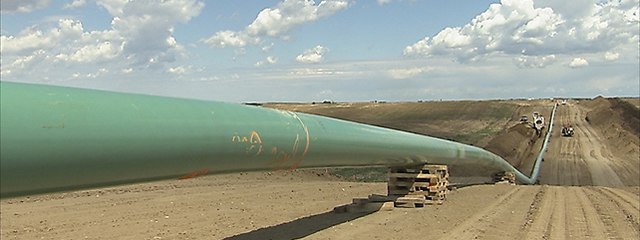Business and Economy
In major twist, pipeline company asks U.S. to pause Keystone XL process

(Photo from Keystone-xl.com)
WASHINGTON – In a surprise move that could have a political ripple-effect in two countries, the company behind the controversy-plagued Keystone XL pipeline has asked the U.S. government to temporarily suspend its application.
Monday’s request from TransCanada Corp. adds a new twist to one of the biggest Canada-U.S. political irritants of recent years, potentially making the pipeline a 2016 U.S. election issue to be settled by the next president.
The administration said it was reviewing a letter to Secretary of State John Kerry, in which the Calgary-based company requested a delay while the Nebraska stretch of the pipeline remains disputed.
It’s another page in an already-epic, years-long battle – which has spilled into similar fights across the continent over export pipelines for Canada’s land-locked oilsands bitumen.
“TransCanada believes that it would be appropriate at this time for the State Department to pause in its review of the Presidential Permit application for Keystone XL,” said the letter.
“This will allow a decision on the permit to be made later based on certainty with respect to the route of the pipeline.”
It’s also an about-face in the company’s message. Until recently, it would have been unimaginable for TransCanada or its government backers in Ottawa to be requesting a delay, given their repeated demands for immediate approval of a project that would carry nearly one-quarter of all Canadian oil exports.
With opposition on multiple fronts, opponents say, the company obviously hopes to step back and return to the fray under more favourable conditions – not unlike a military tactical retreat.
The Nebraska political activist who organized ranchers against the project urged President Barack Obama to ignore the company’s request – and reject the pipeline now.
“They are doing this for one reason – TransCanada hopes a Republican gets into office because they all said they would approve (it),” Jane Kleeb said in an email.
“TransCanada is facing a loss, they know it. So this is their last chance to try and save their project.”
Its short-term political prospects seem dim indeed. Obama has repeatedly expressed skepticism. His supporters overwhelmingly expect him to reject it.
All the major Democratic presidential candidates also oppose it. Because Republicans universally back it, the pipeline has potential to become an election wedge issue.
It’s become so acutely partisan that the Democratic party leapt at the opportunity Monday to use the latest development for political gain. The party issued a letter asking new supporters to sign up and help fight this corporation that’s apparently pining for a Republican victory.
Monday’s news also holds potential implications for Canada-U.S. relations. With a new Trudeau government hoping to improve ties to the Obama administration, a delay could offer relief from an early sore point.
A pause on Keystone virtually guarantees the initial Obama-Trudeau encounters could focus on other topics, as they cross paths several times this month at the G20, APEC and Paris climate summits.
There’s a big question mark, however, hanging over this delay request.
The U.S. government hasn’t yet responded. The State Department is studying it. Earlier Monday, the White House had signalled plans to announce a final decision during Obama’s term.
“Our expectation at this point… is that the president will make a decision before the end of his administration,” Josh Earnest told reporters. “It’s possible (it could happen this year). It’s also possible it could happen next year.”
The delay idea was billboarded entirely by the company.
And it featured a hairpin-sharp plot twist. In a reversal of roles befitting this seven-year soap opera, the company is now basing its request on a precedent that infuriated it not too long ago.
In early 2014, the U.S. announced a delay. It said it couldn’t make a decision on granting a cross-border permit for the pipeline route, because the route was tied up in litigation in Nebraska.
The company and the Canadian government fumed at that. The route is no longer being fought in court. It’s back to being reviewed by Nebraska’s arm’s-length public-services commission.
And the company is now citing what happened in 2014 as a custom: “The company believes there is sound precedent,” it said in a statement, “for making this (delay) request.”





















